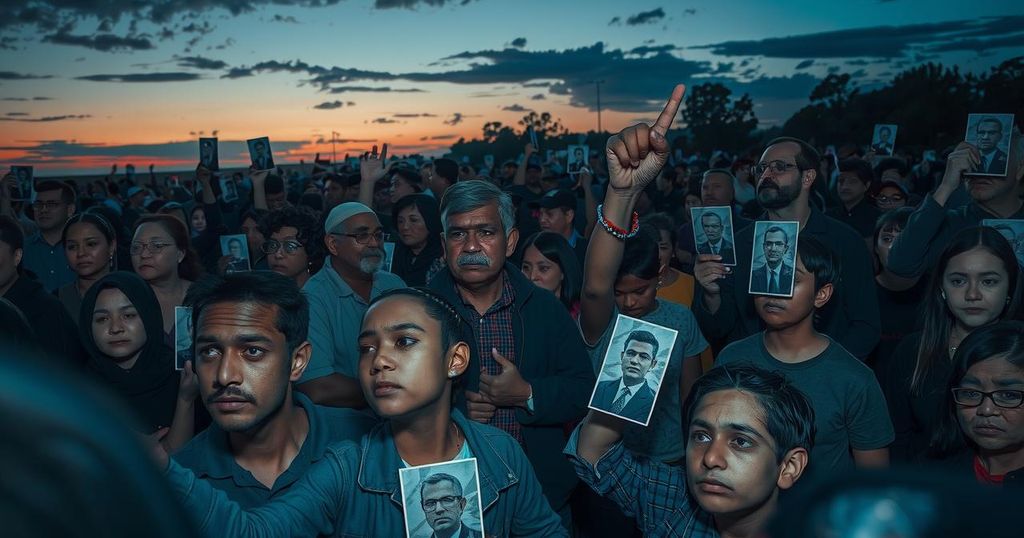Death of Activist Abdelmonem Al-Marimi Sparks Outrage in Libya

- Abdelmonem Al-Marimi died in custody on July 5, raising urgent questions.
- Surveillance footage reveals his tragic last moments before death.
- Conflicting accounts from authorities fuel public distrust in Libya’s institutions.
- The late activist was an influential cultural figure and outspoken critic of corruption.
- His funeral turned into a powerful demonstration against the current government’s actions.
Activist’s Death Raises Questions About Official Narrative
The passing of Abdelmonem Al-Marimi has sent shockwaves through Libya, giving rise to urgent calls for clarity and justice regarding his untimely death. The 42-year-old activist, renowned for his vocal stances against corruption, died on July 5 while in the custody of the Attorney General’s office in Tripoli, mere moments after it was announced that he would be released. Surveillance footage, which was made public on July 6, captured his last moments of life, depicting him arriving at the premises and later jumping from a third-floor stairwell, leaving behind more questions than answers regarding the circumstances of his death.
Conflicting Reports from Authorities Heighten Concerns
Moreover, the conflicting statements from authorities only heighten the intrigue surrounding this tragedy. The Internal Security Agency (ISA) has outright denied any claims of abduction, alleging Al-Marimi was arrested for his behavior and held in accordance with the law. In stark contrast, the Attorney General’s office claims he was awaiting his family’s arrival for his release. Reports indicate that during his detention, he had no contact with a lawyer or outside support, fueling suspicions regarding his treatment while in custody. Rather than providing reassurance, the government’s assertions about Al-Marimi’s physical condition further complicate the story as discrepancies arise regarding his last moments. Authorities maintain that he had been released and was expected to reunite with family, but how does one explain the tragedy of his death?
Cultural Impact of Activism and His Legacy
Abdelmonem Al-Marimi was not just an activist; he was a cultural figure who used his creativity to challenge the status quo of Libyan society. Beyond his activism, he was a lyricist and the creator of a widely beloved animated series, Haj Hamad, which tackled contentious issues through satire for over two decades. His willingness to speak out against injustice and his efforts to unify voices across Libya made him a target for regime-linked media, who unleashed a barrage of unfounded accusations against him. Following the escalation of anti-government protests in mid-May, he became a focal point of dissent with thousands rallying under his banner, demanding reform in a nation grappling with corruption and strife.
Public Grief Signals Discontent and Calls for Justice
Libya’s citizens are now left in mourning as they reflect on both the loss of Al-Marimi and the oppressive climate that led to his demise. Thousands gathered for his funeral in Zawiya on July 6, turning a somber event into a powerful statement of resistance against corruption. The scene emphasized solidarity among mourners from various political and social backgrounds, each echoing their grief over Al-Marimi’s tragic end. As they gathered, many expressed their disbelief over the circumstances, indicating faint trust in the institutions that govern their lives. Concerns about his mental and physical treatment leading to his death persist, with many rejecting the notion that Al-Marimi would willingly take his own life moments after hearing he had been released. As skepticism mounts regarding official accounts, the public’s need for truth remains unfulfilled, amidst fears of ongoing repression against dissent.
The death of Abdelmonem Al-Marimi has triggered a torrent of questions and deep concerns regarding human rights in Libya. As the nation grapples with conflicting narratives from authorities and overwhelming public grief, the need for accountability looms large. His legacy as a brave activist and cultural figure serves as a reminder of the dangers faced by those who dare to confront corruption and injustice.








